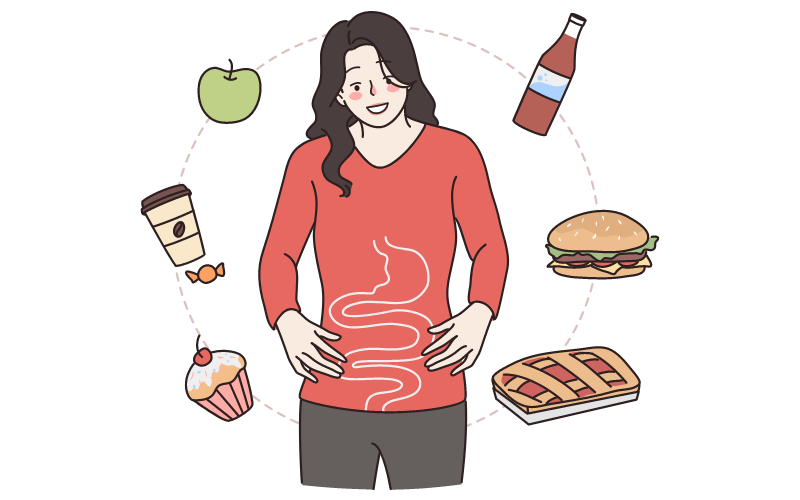“We live in a world where our foods are more in line with fashion & trends than being in line with core nutrition. Like fashion changes, the food trends change often…however, the fact remains the same the healthiest foods are still the simplest ones because nature is simple if you abide by it.” – Anonymous.
What Exactly Is Digestion?
Digestion is the complex process of converting food into nutrients that your body can use for energy, growth, and cell repair. Good digestion is of utter importance for a healthy body. The digestion process also generates waste that must be eliminated. The digestive tract is essential to our health because it breaks food down into nutrients and energy that the body can use and eliminates waste. Even healthy people can have digestive issues due to a lack of fiber or probiotic-rich foods. Some types of food, including vegetables and yogurt, can help this digestion process.
Living in an Indian household, the two things I immediately put my finger on when it comes to digestion are moong dal (green gram) and rice. Moong dal is rich in high-quality proteins with high digestibility and is an excellent source of carbohydrates, vitamins, minerals, fiber, and essential fatty acids. To promote the growth of beneficial bacteria in the small intestine, moong dal may function as a prebiotic, which may support maintaining a healthy digestive system. Rice, available in different varieties, is also proven to improve digestion.
Rotis are thought to be heavier than rice and more challenging to digest. Since it contains fiber, it requires less effort from the digestive system. Plain-cooked white rice is bland and excellent when a person has digestive issues. Six grams of fiber can be found in just one ounce of uncooked rice bran. Because of its high fiber content, rice is a crucial food for preventing constipation and balancing the digestive system—additionally, rice functions as a natural diuretic, which aids in the body's water loss.

Yogurt, commonly known as dahi, is also very effective in digestion. Consuming yogurt daily helps to maintain regular bowel movements and improves the flora of our bodies. It kills harmful bacteria in the gut and improves the health of our digestive system. Yogurt has also been shown to help with lactose intolerance, constipation, inflammatory bowel disease, and infections. Yogurt consumption daily reduces inflammation in the body. Most autoimmune diseases, diabetes, cancer, and arthritis are caused by inflammation.
Trending – Oxitrim Review
Vegetables and fruits mostly have natural digestive properties. The next on this list would be green vegetables. For the first time, scientists have discovered how a particular kind of sugar in green, leafy vegetables feeds the “good” bacteria in our bellies to ease digestion while obstructing the “bad” bacteria that might harm us. “Sulphur is critical for building proteins, the essential components of all living organisms,” said one of the researchers, Spencer Williams, from the University of Melbourne in Australia. “SQ is the only sugar molecule which contains sulfur, and ‘digestion' of the molecule by bacteria releases sulfur into the environment, where it re-enters the global ‘sulfur cycle' to be reused by other organisms.”
Citrus fruits are also important when digestion is involved. Citrus fruits are high in soluble fibers, which can help with digestion and cholesterol levels. Citrus fruits are essential sources of nutrition and energy and are important in supplementing healthy diets. Citrus fruits mainly comprise carbohydrates like sucrose, glucose, and fructose. Oranges have a high soluble fiber content. Orange, lemon, and pineapple juices are examples of citrus fruits whose juices are recognized to aid in digestion. A lack of stomach acidity sometimes causes indigestion, and the natural acids in these fruits may be a fix.
Banana, one of the fruits regarded as the simplest to digest, is perfect if one tends to overeat. This fruit's soluble fibers, which are delicious and pulpy, are believed to lessen diarrhea. It is high in potassium and aid in the smooth operation of the digestive system. Apples also help in digestion.
Ginger has also proven to be effective when a person faces digestive issues. Papaya is also one of the fruits which help in digestion. Papain is a naturally occurring digestive enzyme found in papaya.
To properly digest and absorb the nutrients from a person's food, digestive enzymes aid in breaking down the food ingested. They also aid in the relief of symptoms like gas, bloating, and constipation. Regular bowel movement production and passage are supported by fiber. Additionally, the papain enzyme in papaya may encourage regular bowel motions and aid in the digestion of food.
Chickpeas are a type of legume related to kidney beans and peanuts and help digestion. Garbanzo beans are another name for them. They have a creamy texture and a buttery, nutty flavor. The Desi variety is more common in the Middle East and India. Kabuli chickpeas are more minor, darker, and less round. Chickpeas are high in dietary fiber, particularly raffinose, a soluble fiber. This is broken down by the good bacteria in our gut, allowing our colon to digest it slowly. Eating more chickpeas has been shown in studies to help make bowel movements more accessible and more regular.
Our body creates digestive enzymes naturally, although sometimes incorporating these foods and/or taking digestive enzymes can be helpful if our body needs extra support. Even though these foods help digestion, it does not mean they should be eaten without moderation in their portions. Instead of focusing on consuming a single food, it is best to eat a range of foods and maintain lifestyle practices that support healthy digestion.
Every food plays a little role in digestion. One of the most foundational things we can do to support our digestion is through the foods we eat, as they can heal. These are some of the many foods that are basic and support digestion. Of course, everyone is different, and what works for some of us won’t work for others.


Leave a Reply